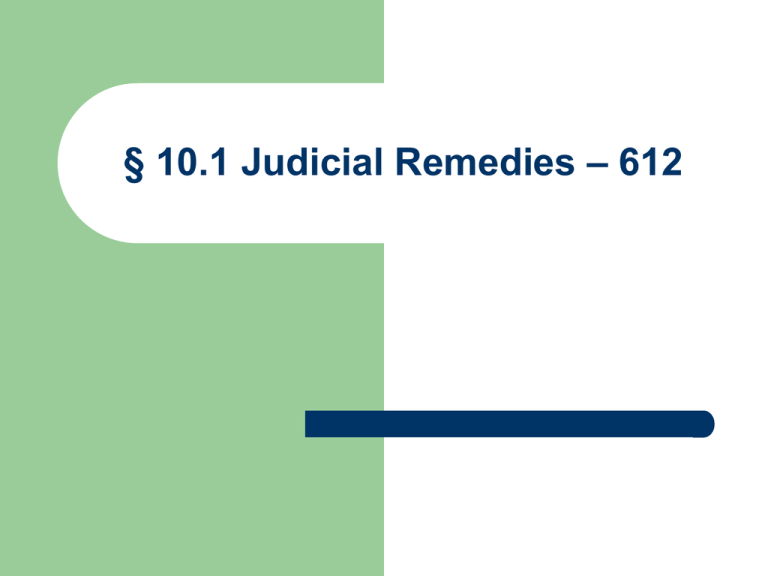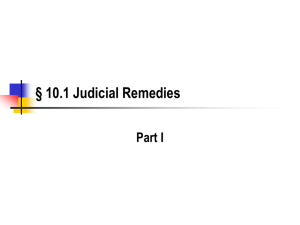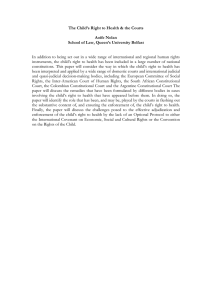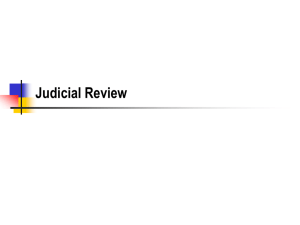Slides - Chapter 10
advertisement

§ 10.1 Judicial Remedies – 612 Basic Requirements Court must have jurisdiction Plaintiff must state a recognized cause of action and seek a recognized remedy This is the rub in most of the environmental cases - what is the plaintiff's interest? Must be a real case and controversy – – Supreme Court does not give advisory opinions States often do Explicit statutory review provisions in the enabling act Should review be by trial courts or appeals courts? What do what best? Which courts usually get rules and final orders? – Why? – Rules and final orders tend to go the appeals courts They are judged on the record like an appeals case What usually goes to the trial (district courts? – Things that need testimony or involve repetitive issues with no real legal novelty (FOIA) go to the trial courts No explicit statutory review procedures 28 USC 1361 – Gives district courts jurisdiction over mandamus to require an officer or employee of the US or an agency to perform a duty owed the plaintiff 28 USC 1343 – Jurisdiction to hear cases under 42 USC 1983 and other civil rights statutes (mostly about state officials) 28 USC 1331 Actions arising under federal law, constitution, treaties, etc. Gets most federal agency actions Plaintiff can sue where the defendant resides, the cause of action arose, or the plaintiff resides, unless real property is involved Once 1331 is invoked, the APA 701-706 controls No $10,000 minimum for jurisdiction agency law or federal questions in general Federal Sovereign Immunity What is the effect of sovereign immunity? In 1976 the feds abolished federal sovereign immunity for actions other than money damages Money damages come under the Federal Tort Claims Act (FTCA) LA abolished all sovereign immunity in the 1974 constitution – What does this mean for state agency actions? Removal to Federal Court City of Chicago v. International College of Surgeons (1997) – 615 What sort of dispute was this? – What happened before the Chicago Landmarks Commission? – Owner lost Where did the owner then turn? – Land use - Dispute over the findings of the city's historic buildings commission State court What did the city do? – Removed to federal court Grounds for Removal to Federal Court USSC says removal is proper if there are federal/constitutional issues at stake Federal court has the right to resolve pendant state claims, even agency matters that would usually be resolved by state courts Why did the City remove the case? – Federal courts are often more deferential to agency decisions than are state courts Why did Stevens and Ginsburg dissent? – They did not want to erode the power of the states to develop their own administrative law Injunctions and Declaratory Judgment – 617 What is an injunction and what do you usually have to show to get one? – – – An order forbidding someone to do something Irreparable harm Good chance of prevailing on the merits Why are injunctions and declaratory judgments the same for agencies? – You can either enjoin the agency for acting or ask that the agency's action be declared illegal Is there a right to an injunction? No right to an injunction The Court balances the plaintiff's interests with those of the government § 10.1.2b Mandamus – 618 If you are trying to make someone do something, then the court may call this a mandamus Why is making the agency do something much more politically complicated? – Because in most cases courts cannot substitute their decisions for the agency's decision What is the difference between a discretionary and a ministerial act? What must the agency do versus what may it do Why does this matter for both injunctions and tort claims act cases? – – Courts will not order discretionary actions, nor hold the agency liable for them in damages. Big deal in state law What was the mandamus issue in Marbury v. Madison? – Started with Marbury v. Madison, which asked Madison to issue Marbury's judicial commission Who has Federal Jurisdiction on Mandamus? Traditionally limited to courts within the District of Columbia Now any court can do it, but they are difficult to get What is the best way for plaintiff to force an agency to act? – Ask for an injunction under 28 USC 1331, using the language of APA Sec 706(1) which allows a court to compel an agency action unlawfully withheld. Habeas Corpus What is a writ of habeas corpus? When is it important in agency actions? How might it be very important for bioterrorism and homeland security? Is there a right to bail in administrative detentions? – Why or why not? § 10.2.2 Tort Liability of Officials – 624 What happens if you sue federal officials for common law torts? – Common law torts against federal officials are dismissed and brought against the government under the FTCA What is the exception to this rule? – – Constitutional torts or actions outside the scope of employment Under Bivens, a cause of action for damages can be brought against federal agents who violate constitutional rights. Bivens v. Six Unknown Named Agents of Federal Bureau of Narcotics, 403 U.S. 388, 397, 91 S.Ct. 1999, 29 L.Ed.2d 619 (1971). Federal Tort Claims Act (FTCA) What was the product in Berkovitz? What is the role of the FDA? What was the claimed negligence? What was the FDA’s defense? What was the issue in Varig Airlines? How is this case different from Varig Airlines? What are the policy issues in allowing claims against the government? Suing State Officials What is the jurisdictional requirement for a 42 USC 1983 action? – Acting under color of state law State and local officials local government Not state government itself – 11th Amendment § 10.2.2b Immunity from Liability – 625 Why is personal immunity critical? Absolute v. qualified immunity – – 1) Prosecutors and adjudicators (ALJs) get absolute immunity from damage suits 2) everyone else gets qualified immunity Federal rules for qualified immunity are the same as those for state officials under 1983 What does the president and his aids get? The president and aids get absolute immunity for highly sensitive activities Monica? What is the test for qualified immunity? Is the conduct "objectively reasonable"? There can only be liability for constitutional violations if the right is "clearly established“ You can get an injunction for a constitutional violation when you cannot get damages Thus you could enjoin a violation without being able to collect damages § 10.3 Recovery of Fees – 627 Each party pays his own fees, even against the government. Why are fee recovery statutes critical to citizen involvement? Why did the plaintiffs in Western States Petroleum Association v. EPA not qualify for attorney's fees, even though their claim against the EPA's regulation prevailed? – – The statutes only allows fees for furthering the purpose of the EPA Blocking enforcement of a regulation does not further the purpose of the EPA. What is the Equal Access to Justice Act? Allows recovery of fees in contesting agency or DOJ actions unless the court finds that the government's position is "substantially justified" or special circumstances make an award unjust. Should it be amended to allow the government to collect fees? Preclusion of Judicial Review What is the effect of precluding judicial review? Is this favored by the courts? Where does Matthews v. Eldridge come in? When would you expect the courts to be most open to preclusion of review? Bowen v. Michigan Academy of Family Physicians Dispute over the payment of Medicare Claims – What is the Matthews analysis? – This is decided by private contractors called fiscal intermediaries Whose rights are at issue? What is the distinction between reviewing the regs and reviewing the claims? Exhausting Administrative Remedies Shalala v. Illinois Council on Long Term Care – Plaintiffs must exhaust their remedies at the agency level before going to court What is the death penalty problem? Does this give the government too much power? Limiting Review of Regulations Congress can put a statute of limitations on the review of regs – – Often 60 days What if do not know about the applicability of the reg until later? What cannot be precluded? Commitment to Agency Discretion Can you sue prosecutors to force them to bring prosecutions? – What was the prisoner’s claim in Heckler v. Chaney? – Can you think of a possible exception? (Court could have dodged on a medical practice argument) What will you have to show to get a court to force action? When is Preclusion a Good Policy? The president's decision to accept or reject a list of base closings An agency's decision to quit funding a health program out of lump sum appropriations An agency's refusal to reconsider its own decisions The CIA director's decision to fire an employee when the statute says he can do so whenever such termination is necessary or advisable in the interests of the united states – (the decision was reviewable on constitutional grounds) No Law to Apply Why is the problem of no law to apply the real reason why the courts do not review discretionary actions? This is the key to discretion cases, esp. cases like Chaney, where there is no statute or regulation to set the standard of conduct Why does this make it nearly impossible to review agency's failures to act? What Can You Do if the Agency Claims it does not have to Act? (i) is it really discretionary? (ii) is it based on a erroneous legal determination? (iii) does the statute allow a private right of action against the regulated party, say for adverse health effects? (iv) you can petition the agency to promulgate a rule requiring the action (v) use political power to force the agency to act End of Chapter


